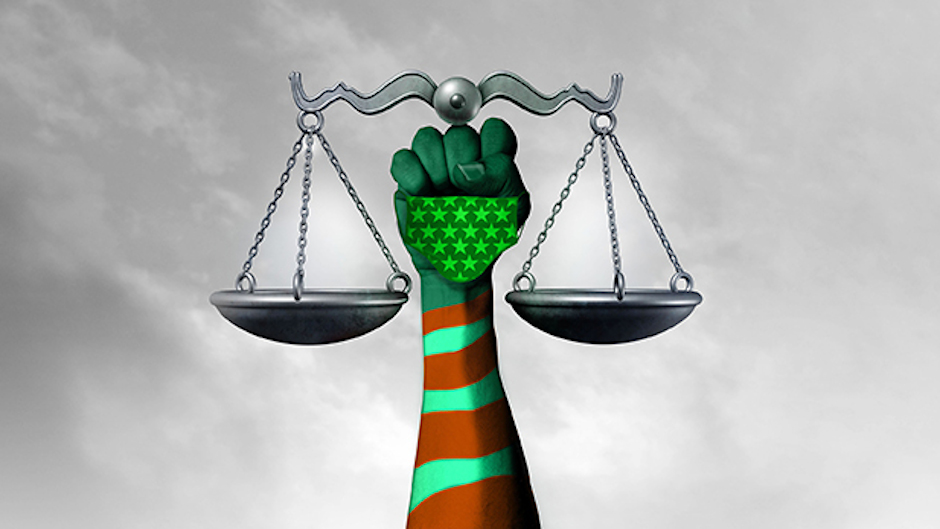Discussing civil rights challenges caused by the COVID-19 pandemic, “Defending and Promoting Civil Rights in a Time of Coronavirus” was the virtual half-day symposium hosted by Miami Law, in partnership with the civil rights section of the Association of American Law Schools, and the University of Miami Race and Social Justice Law Review.
The conference was organized by Miami Law’s Elizabeth M. Iglesias, professor of law and chair of the civil rights section of the AALS, who in March of this year established a Working Group within the Civil Rights Section in order to examine threats posed to civil and human rights by the divergent responses of state, local and national governments throughout the hemisphere
“The urgency of this moment is clear. Although we have all been impacted by the virus, we have not all been impacted equally. The disproportionate effects of the virus have major implications for many aspects of our society and our lives, including civil and human rights, public health, financial stability, poverty, privacy, criminal justice, and immigration, among many others,” said Miami Law’s Anthony E. Varona, dean and M. Minnette Massey Professor of Law, in his opening remarks. “At the same time, America is living through a moment of reckoning, sparked by the killing of George Floyd and other unarmed Black people at the hands of police and the protests that rippled across the country thereafter. I suspect I am not the first to note that while the virus itself is colorblind, its effects have not been so.”
In the keynote address, Gerald Torres, professor of environmental justice at the Yale School of the Environment, professor of law at Yale Law School, and the first Latinx president of the Association of American Law Schools, urged the attendees to not look just at what has emerged as a reaction to the COVID pandemic but as a form of governance under what has become chronic emergencies and unrest. He said this wasn’t the first time of governing in a time of exception and can be applied to Black Lives Matter protests.
“The civic unrest produced an additional justification from the [Trump] administration for treating the resistance as if it weren’t part of the normal and accepted response of a people against, what they thought, was the overreaching and oppressive actions of their government,” the law pioneer said. Torres has spent his career examining the intrinsic connections between the environment, agricultural and food systems, and social justice.
Four panels of nationally recognized experts, most currently members of the Working Group on Civil Rights of the AALS’s Civil Rights Section, focused and explored a wide range of topics, including civil rights issues exacerbated by the pandemic and the role of international legal institutions in protecting human rights against discrimination and unequal treatment in employment, housing, education, and access to justice.
One panel examined civil rights issues exacerbated by the pandemic and the role of International legal institutions in protecting human rights, including the role of international courts, United Nations special rapporteurs, and the Inter-American system in securing applicable norms relating to states of siege, crimes of negligence, discriminatory policing, excessive use of force, domestic violence, and terrorism.
The way the pandemic has uncovered civil right issues arising out of detention, surveillance, crowd control practices and policies directed at immigrant populations and at protests against stay-at-home orders and in support of Black Lives Matter, including constitutional doctrines that reduce police accountability and pending legislation to increase it was the focus of another discussion.
A third panel drilled into the way the pandemic has exacerbated civil rights issues arising from inequality and unequal treatment in employment, housing, education and access to justice, focusing specifically on its exacerbation of vulnerabilities based on race, disability, age, gender, class and occupations cast as “essential.”
A focus on the civil rights issues the pandemic has exacerbated in and around the rights of citizenship, exclusion of immigrants, and treatment of native communities, including but not limited to citizenship based discrimination in access to federal relief and health benefits, mass deportations, discriminatory treatment of naturalized citizens, violations of voting rights and public health rationing was tackled in the final panel.
“The COVID-19 pandemic exacerbates conditions that historically and foreseeably have resulted in political violence. How a state responds to political violence determines the kind of regime it is,” said Iglesias, who is also chair of the constitutional law section of the Hispanic National Bar Association. “We all have a role to play in ensuring that the United States at all times remains a regime of government that respects human rights under the rule of law, and that includes in times of coronavirus.”
Read more about Social Justice and Public Interest at Miami Law

